Witness Community Highlights

The May 2020 issue of Witness Community Highlights is now available online. This issue includes “Winter Worlds Project Highlights the Wonders of Snow in Alaska and Beyond.” This article summarizes the science education efforts of the Informal Science Learning project, “Our Winter World,” with examples of snow-themed community science nights in Alaskan villages; the design and development of a traveling museum exhibition on snow; and research exploring how cultural background affects learning in museum settings.
Arctic Research Seminar Series with Gerald “J.J.” Frost
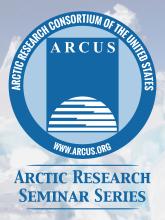
ARCUS invites registration for our next Arctic Research Seminar featuring Gerald “J.J.” Frost (Alaska Biological Research, Inc.). This seminar, discussing the “greening” of the Arctic, will be held Friday, 29 May 2020 from 9:00-10:00 a.m. AKDT (1:00-2:00 p.m. EDT) online via Zoom.
Science Writer/Editor Contract Position
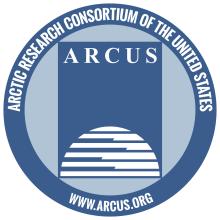
Update: We are no longer accepting applications for this position. ARCUS is seeking a freelance contract science writer/editor! This three- to six-month contract position will work with staff and contributors to our Witness the Arctic and Witness Community Highlights online newsletters, and other publications. Applications were due by 5:00 pm AK on Sunday, 31 May 2020.
Polar Technology Conference Presentations and Recordings Available
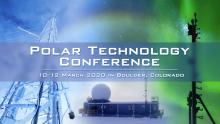
The Polar Technology Conference was held during 10–12 March 2020 in Boulder, Colorado. The goal of the meeting was to link experts in polar science and technology development to discuss current technological resources for polar research and identify barriers to research and application of technology for problems unique to polar regions. Recordings of plenary presentations and presentation files for talks and posters are now available on the conference webpage. This activity was a cooperative effort among the National Science Foundation’s Office of Polar Programs, the Arctic Research Consortium of the United States, and the polar research community.
SEARCH Webinars
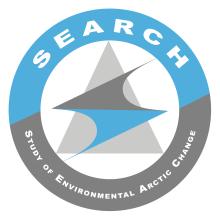
The Study of Environmental Arctic Change (SEARCH) is holding two webinars—open by registration and scheduled for 14 May and 18 May—for participants to discuss Arctic research needs in the context of the Arctic Futures 2050 conference report and other observations and research. Those discussions will help SEARCH develop both its future programs as well as offer input to the 5-year Arctic research plan being developed by the Interagency Arctic Policy Research Committee (IARPC).
Witness Community Highlights

The April 2020 issue of Witness Community Highlights is now available online. This issue includes an article, “Tracking Alaskan Arctic Changes Through a Collaborative Network of Coastal Indigenous Communities,” that is an overview of the Alaska Arctic Observatory & Knowledge Hub (AAOKH) ongoing work to provide northern Alaska coastal communities with the tools, resources, and scientific support to share their expertise through observations of changing coastal conditions and associated impacts to their access of traditional marine resources.
SEARCH Webinars in May
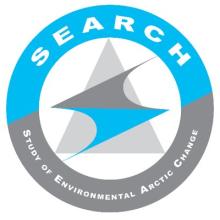
Two webinars—open by registration and scheduled for May 14th and May 18th—will allow participants to discuss Arctic research needs in the context of the Arctic Futures 2050 conference report and other observations and research. Those discussions will help SEARCH develop both its future programs as well as offer input to the 5-year Arctic research plan being developed by the Interagency Arctic Policy Research Committee (IARPC).
SIPN2 Webinar - Registration Available
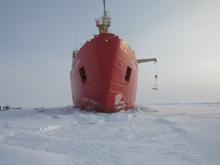
The Sea Ice Prediction Network – Phase 2 (SIPN2) invites registration for an open webinar entitled "Understanding Stakeholder Information Needs for Sea-Ice Forecasting." This webinar will include an overview of stakeholder groups and their information needs, examples of how stakeholder groups deal with sea-ice and relate to sea-ice information, and discussion of how information gathered through stakeholder engagement can be of use to the sea-ice forecasting community. Time for participant questions will follow the presentations. This one-hour event will be held on Tuesday, 28 April 2020, starting at 8:00 a.m. (AKDT).
Arctic Futures 2050 Conference Report

The Arctic Futures 2050 Conference Report and executive summary are now available online! The conference report provides a comprehensive summary of conference sessions and discussions.
2020 PolarTREC Expeditions Postponed
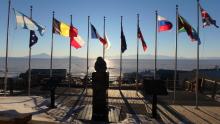
COVID-19 has had far reaching impacts. In response to this uncertainty and for the safety of the teams and the communities of which they would visit, the deployment of all the 2020 PolarTREC educators to both the Arctic and Antarctica has been postponed until 2021. We will continue working with all the teams over the next year and in preparation for 2021. In the meantime, we'll be highlighting past expeditions and continuing to host science focused seminars.
Arctic Warming Puts Ringed Seals In Peril

In a new interview with Yale Climate Connections, SEARCH Executive Director Brendan Kelly discusses the impact that Arctic warming is having on ringed seals.
Arctic Indigenous Scholars Program Selects Three Scholars for 2020
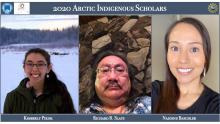
ARCUS and the Inuit Circumpolar Council Alaska are pleased to announce the 2020 Arctic Indigenous Scholars. Please welcome Kimberly Pikok from Utqiaġvik, Richard B. Slats from Chevak, and Naidene Baechler from Newhalen. The three scholars will travel to Washington DC to share their views and build relationships with policy and decision-makers. Please view our webpage to learn more about this year’s scholars.
Sea Ice for Walrus Outlook Season Begins
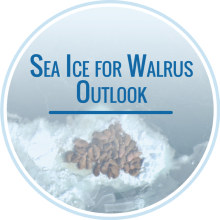
The Sea Ice for Walrus Outlook (SIWO) season is now underway. SIWO is a resource for Alaska Native subsistence hunters, coastal communities, and others interested in sea ice and walrus. The SIWO provides weekly reports during the spring sea ice season with information from the National Weather Service, local observers, and other sources on weather and sea ice conditions relevant to walrus in the northern Bering Sea and southern Chukchi Sea regions of Alaska.
Witness Community Highlights

The March 2020 issue of Witness Community Highlights is now available online. This issue includes two articles: “Long-Term Monitoring Program Sheds Light on High-latitude Landscape Response to Ongoing Warming,” an overview of the data-supported research on how ground temperature responds to ongoing climate change; and "Indigenous Foods Knowledges Network: Facilitating Exchange between Arctic and Southwest Indigenous Communities on Food and Knowledge Sovereignty,” a summary of how this program brings together Indigenous scholars, practitioners, and community members to exchange knowledge and experience in support of food sovereignty.
PolarTREC Orientation Goes Virtual
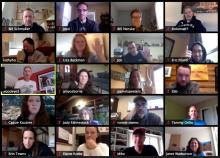
PolarTREC educators from across the country are attending their orientation virtually this week due to the cancellation of the in-person meeting that was to take place in Boulder, CO. Learn more about their upcoming 2020-2021 expeditions to various Arctic and Antarctic research sites and onboard research vessels.
Visit the Arctic Calendar to See Updates on Events
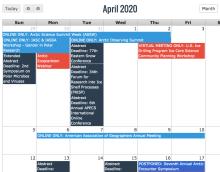
Visit the Arctic Calendar to see updates on events that have made postponements, cancellations, or that have moved online due to the COVID-19 pandemic. We've been updating changes as we see them, but please contact us if you have any additional updates or if you would like to submit a new virtual event through the online form at: http://www.arcus.org/events/arctic-calendar/submit or by emailing calendar [at] arcus.org
Polar Technology Conference Livestream Available
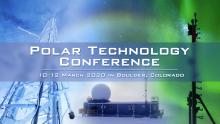
A livestream broadcast of the Polar Technology Conference plenary sessions will be available during 10–12 March 2020. The goal of the meeting is to link experts in polar science and technology development to discuss current technological resources for polar research and identify barriers to research and application of technology for problems unique to polar regions. Please visit the conference webpage to view details including our line-up of speakers and topics, agenda, and abstracts, and details on how to access the livestream.
PolarTREC Educator as Guest Blogger for National Wildlife Federation
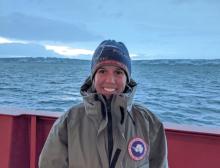
PolarTREC educator Sarah Slack, currently aboard the R/V Nathaniel B. Palmer in the Amundsen Sea, was a guest blogger for the National Wildlife Federation Blog. The article is based on one of Sarah’s journals during her expedition looking offshore from the Thwaites Glacier in West Antarctica at the seafloor and the records of glacial and ocean change contained in the sediments around it. You can read more of Sarah’s journals and about what she has learned on the Thwaites Offshore Research expedition.
PolarTREC Live Event from the Nathaniel B. Palmer in the Amundsen Sea
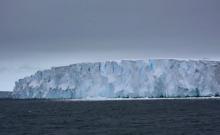
Join PolarTREC educator Sarah Slack and researcher Frank Nitsche who will be presenting from aboard the R/V Nathaniel B. Palmer somewhere in the Amundsen Sea. Sarah and Dr. Nitsche will discuss the fieldwork investigating the Thwaites Glacier, surrounding waters, and seafloor in West Antarctica. They will also talk about what it's like to be part of a large research team and how it is to live on a research vessel. This event is free and will take place Monday, 9 March at 7:15 AM AKDT (8:15 AM PDT, 9:15 AM MDT, 10:15 AM CDT, 11:15 AM EDT).
Find out more about what Sarah is learning through her journals on Thwaites Offshore Research here.
IARPC Contract Position Available

The Interagency Arctic Research Policy Committee (IARPC) seeks a creative professional to use web-based skills to advance Arctic science coordination at a critical time in the Arctic research enterprise. IARPC is seeking a Web Manager & Community Coordinator who will be responsible for managing its online user-driven collaborative website called IARPC Collaborations. This will be a contracted position, managed through ARCUS. The application deadline is Wednesday, 25 March 2020, 5:00pm AK.
Witness Community Highlights

The February 2020 issue of Witness Community Highlights is now available online. This issue includes three articles: “Long-Term Research Addresses Resilience of Beaufort Sea Lagoons,”
an overview of ongoing ecosystem research in these Arctic systems; "MicroFEWs: Exploring the Impacts of Local Renewable Energy Projects on Remote Arctic Community Security and Resilience,” a summary of how this program explores those connections in remote Arctic communities; and “Alaska Fire Science Consortium Addresses Management Information Needs,” a discussion on collaborative research that involves end users in developing fire management resources.
Two Edward Little Teachers Heading to Polar Regions
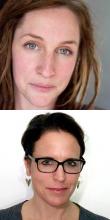
Sun Journal article coverage of two Edward Little High School teachers's, Jenn Heidrich and Erin Towns, both selected for PolarTREC expeditions. Jenn Heidrich was selected to go on the Warming and Removals in Mountains of Northern Canada expedition in Yukon, Canada, and Erin Towns was selected to go on the Greenland Subglacial Tremor Project to Ilulissat, Greenland.
2019 Sea Ice Outlook Post-Season Report

The 2019 Sea Ice Outlook (SIO) Post-Season Report is now available. The SIO is a community network activity led by the Sea Ice Prediction Network – Phase 2 Project Team, with contributions from key partners, to advance our understanding of the state and evolution of Arctic sea ice cover. This report includes in-depth discussions and analysis of factors impacting sea ice this past summer, the SIO contributions, regional observation, predicted spatial fields, Antarctic contributions, seasonal sea ice forecasting for the Alaska marine shipping industry, and a summary from the Sea Ice Drift Forecast Experiment (SIDFEx).
Helping Alaskan Communities Facing Climate Risks

SEARCH scientists examine how best to use science to help communities respond to rapid climate change in the Arctic in this new article from Eos magazine.
Arctic Research Seminar Recording Now Available
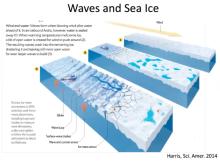
A recording is now available of the Arctic Research seminar with Jim Thomson, Senior Principal Oceanographer at the University of Washington's Applied Physics Lab. Thomson's presentation explored "Ocean Waves in the New Arctic", as the rapid decline of summer sea ice cover in the Western Arctic has been accompanied by a dramatic increase in the sea state of the region.
